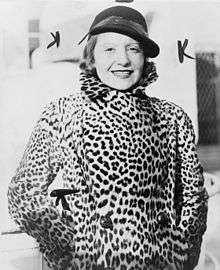Elisabeth Bergner
| Elisabeth Bergner | |
|---|---|
 Elisabeth Bergner, 1935 | |
| Born |
Elisabeth Ettel 22 August 1897 Drohobych, Austro-Hungarian Empire (now Drohobych, Ukraine) |
| Died |
12 May 1986 (aged 88) London, England, UK |
| Occupation | Actress |
Elisabeth Bergner (22 August 1897 – 12 May 1986) was a German language film and stage actress who acted in Germany until moving to England to escape the Nazi threat to the Jews. Joseph L. Mankiewicz's classic film All About Eve was reportedly based on her own experience of employing a young female admirer who then tries to upstage her.
Life and career
She was born Elisabeth Ettel in Drohobych, Austro-Hungarian Empire (present-day Ukraine) to Anna Rosa (née Wagner) and Emil Ettel, a merchant. She grew up in a secular Jewish home. The Hebrew she heard in her childhood was associated with Yom Kippur and Pesach, and on her visits to Israel she apologized for not knowing the language.[1][2][3]
She first acted onstage at age 14, and appeared in Innsbruck a year later. In Vienna at age 16, she toured Austrian and German provinces with a Shakespearean company. She worked as an artist's model, posing for sculptor Wilhelm Lehmbruck, who fell in love with her. She eventually moved to Munich and later Berlin.[4]
In 1923 she made her film debut in Der Evangelimann. With the rise of Nazism, Bergner moved to London with director Paul Czinner, and they married in 1933. Her stage work in London included The Boy David (1936) by J.M. Barrie, his last play, which he wrote especially for her, and Escape Me Never by Margaret Kennedy. Catherine the Great was banned in Germany because of the government's racial policies, reported Time Magazine on March 26, 1934.[4]
She was nominated for an Academy Award for Best Actress for Escape Me Never (1935). She repeated her stage role of Rosalind, opposite Laurence Olivier's Orlando, in the 1936 film As You Like It, the first sound film version of Shakespeare's play, and the first sound film of any Shakespeare play filmed in England. Miss Bergner had previously only played the role on the German stage, and several critics found that her accent got in the way of their enjoyment of the film, which was not a success. She returned intermittently to the stage, for instance in the title role of John Webster's The Duchess of Malfi in 1946.
In 1973, she starred in the Academy Award-nominated and Golden Globe-winner for Best Foreign-Language Foreign Film of 1974, Der Fußgänger (English title: The Pedestrian). Bergner temporarily returned to Germany in 1954, where she acted in movies and on the stage; the Berlin district of Steglitz named a city park after her. In 1980, Austria awarded her the Cross of Merit for Science and Art and, in 1982, she won the Eleonora Duse Prize Asolo.[4]
Death
She later moved to London, where she died aged 88 from cancer. She was cremated at Golders Green Crematorium on 15 May 1986. Her ashes lie in the West Cloister and have an oval memorial tablet.[4]
All About Eve
Bergner is considered by several critics to be the inspiration for the character of Margo Channing in Joseph L. Mankiewicz's classic film, All About Eve. Bergner had a real-life incident about a would-be Eve Harrington when Bergner was performing in the play The Two Mrs. Carrolls (1943). Bergner helped a young actress, and the actress "took over" Bergner's life. Bergner recounted the story to writer Mary Orr, who based a short story "The Wisdom of Eve" (1946) in Cosmopolitan magazine on Bergner's experience.
In Orr's original short story, like in the film, the Eve Harrington character gets away with everything, and is last seen heading to Hollywood with a "thousand dollar a week contract in her pocketbook".
Literary references
The character of Dora Martin in the novel Mephisto by Klaus Mann is reportedly based on her.[5]
Bibliography
- Anne Jespersen: Toedliche Wahrheit oder raffinierte Taeuschung. "Die Frauen in den Filmen Elisabeth Bergners" in Michael Omasta, Brigitte Mayr, Christian Cargnelli (eds.): Carl Mayer, Scenarist: Ein Script von ihm war schon ein Film – "A script by Carl Mayer was already a film". Synema, Vienna 2003; ISBN 3-901644-10-5 (German)/(English)
Selected filmography
- The Evangelist (1924)
- The Fiddler of Florence (1926)
- Doña Juana (1927)
- Fräulein Else (1929)
- Ariane (1931)
- Dreaming Lips (1932)
- The Rise of Catherine the Great (1934)
- Escape Me Never (1935)
- As You Like It (1936)
- Dreaming Lips (1937)
- Stolen Life (1939)
- 49th Parallel (1941)
- Paris Calling (1941)
- Strogoff (1970)
- Cry of the Banshee (1970)
See also
References
External links
| Wikimedia Commons has media related to Elisabeth Bergner. |
- Elisabeth Bergner at the Internet Movie Database
- Elisabeth Bergner at the Internet Broadway Database
- Elisabeth Bergner at Find a Grave
- Virtual History – Tobacco cards
- Elisabeth Bergner profile at Androom Archives
|